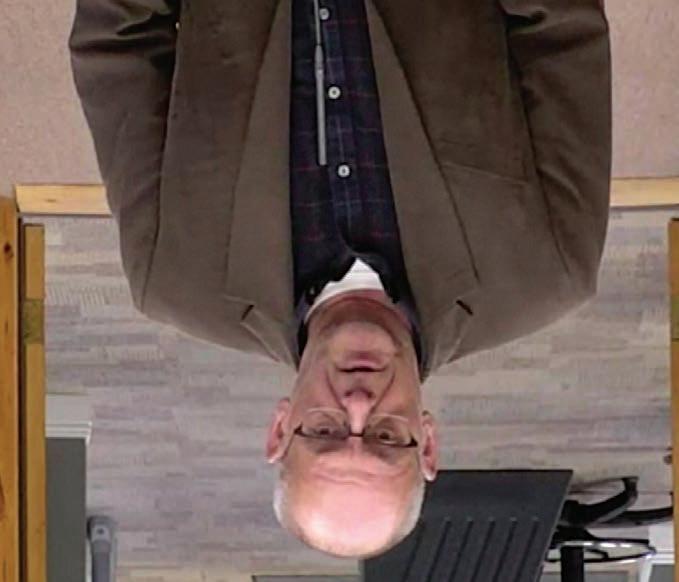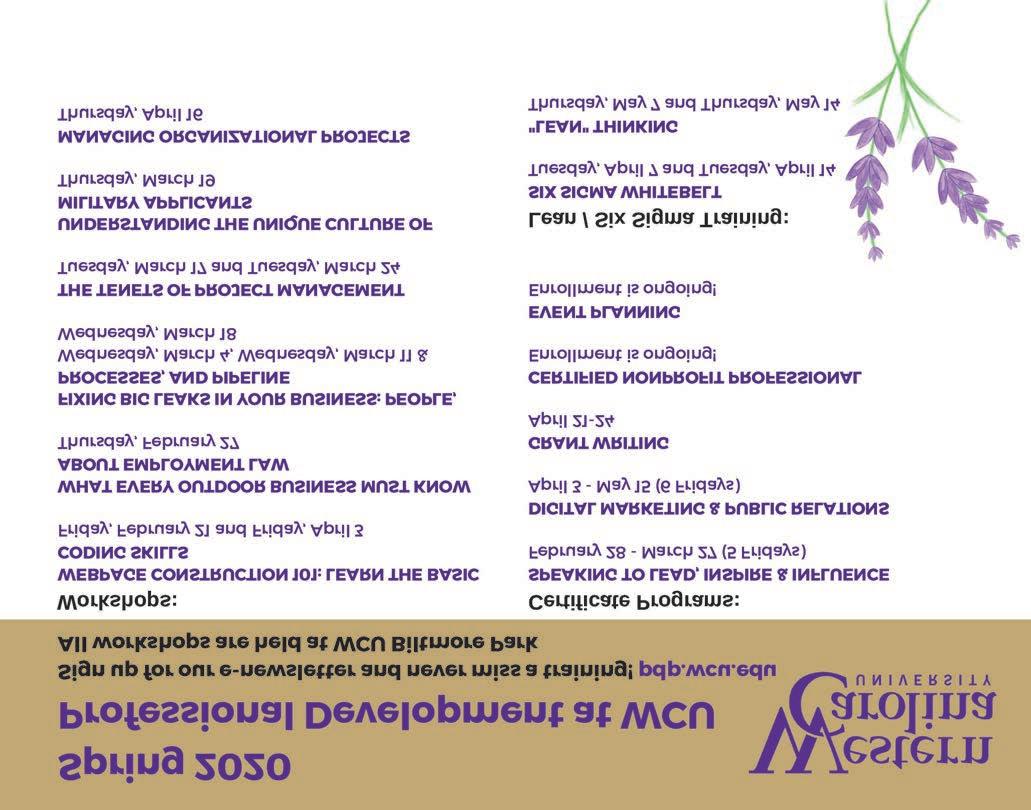
7 minute read
Tribal Council lifts media ban
news Reporters to be allowed in chambers with council permission Tribal Council lifts media ban
February 12-18, 2020 BY HOLLY KAYS S TAFF WRITER T ribal Council expressed its support of the free press during a thoughtful discussion between its members and Smoky Mountain News Publisher Scott McLeod on Wednesday, Feb. 5.
McLeod addressed council as part of the monthly Requests for Time agenda to ask that members consider lifting restrictions on media access to the chambers. Since April 2018, no media representatives other than those employed by the tribally owned Cherokee One Feather have been permitted in the chambers other than for specific photo opportunities.
In his comments, McLeod spoke to the responsibility governmental and media organizations both have toward community members and to the need for both sectors to do their respective parts toward building the trust that is necessary to serving that population.
“Working together, a responsible media and responsible government can help ensure that community members whose time is rightly dedicated to providing for and spending time with their families have access to the information they need to understand what’s happening in their tribal government and to cast aside rumor in favor of fact,” McLeod said.
To do that job well, McLeod said, it’s essential that members of the media have the ability to be physically present while discussions are being had and decisions made. He presented letters in support of lifting the ban from several different media outlets, including Blue Ridge Public Radio, The Sylva Herald, The Smoky Mountain Times, The Mountain Xpress, The Raleigh News & Observer and The Charlotte Observer. He also presented a support letter from Travis Long, a tribal member who is a photojournalist for the News & Observer. The
Smoky Mountain News Publisher Scott McLeod addresses Tribal Council. EBCI video image
Cherokee One Feather has on multiple occasions published editorials opposing the media ban.
The ban was enacted on April 5, 2018, when Tribal Council voted 11-1 to prevent any media representative save those employed by The One Feather from entering the chambers. The move stemmed from Painttown Representative Tommye Saunooke’s assertion that a March 14, 2018, story in The Smoky Mountain News had quoted her inaccurately, a position she reiterated during the Feb. 5 meeting. A review of her comments contained in the video at http://bit.ly/3bxqx1x and the published news story at http://bit.ly/38kErCn showed that the quote was accurate.
McLeod received a generally positive reception from council members, with multiple representatives voicing their support for the free press.
“We were freshmen councilmen when that came up, and I think without discussing it we voted hastily on it without getting all the facts,” said Yellowhill Representative Tom Wahnetah, whose first term began in October 2017. “I know the press does nowadays catch a lot of rap about being fake news, and I’m sure some of it is. But I do believe in free press.”
“That’s one of the votes I wished I could have taken back, because as I see it we have people in Jackson County that don’t have the opportunity to come down here (to the chambers) but a lot of them read The Smoky Mountain News. That’s where they get their information,” added Birdtown Representative Boyd Owl, who took office at the same time as Wahnetah.
Having multiple outlets covering the Qualla Boundary will only benefit the community, One Feather Editor Robert Jumper wrote in a Feb. 7 editorial responding to the Feb. 5 discussion. “There are stories that The Smoky Mountain News covers about our community that we do not and there are stories that the Cherokee One Feather covers in our community that the Smoky Mountain News does not,” Jumper wrote. “To me, that is the importance of having multiple media outlets covering the Eastern Band of Cherokee Indians. While we have two of the best writers and journalists in the business working for us, they cannot possibly cover all the goings-on on the Boundary and those off the Boundary. And, when we in the media do cover the same story, it is a positive thing that we see and report the same facts from different perspectives.”
Painttown Representative Dike Sneed, whose first term began in October, said that occasionally critical press coverage is part of the job.
“We’ve chosen this profession,” he said. “We’re going to have to have a thick skin when it comes to it.”
Birdtown Representative Boyd Owl echoed that sentiment and suggested that reporters work to include opinions from tribal members in addition to quotes from elected officials.
“Sometimes when we make a decision in here, it’s not always a popular decision,” he said. “Sometimes you’ve got to put other people’s comments on there too, not just council members or Chief or Vice Chief.”
Chairman Adam Wachacha said that, as a military veteran, he has respect for the laws of the United States and the role of the free press but that, as a member of tribal government, he has to balance that view with an understanding of the tribe’s status as a sovereign nation.
“Those are things that we have to take full accountability of, being tribal leaders here on the Boundary,” he said.
That said, the tribe’s Free Press Act could use some strengthening, Wachacha said. As it stands now, the act’s provisions pertain exclusively to The One Feather, not to media outlets in general.
“I think we need to elaborate a little bit more on the Free Press Act so it does include other papers,” Wachacha said.
“While this is a huge step in the right direction, equal attention needs to be given to the antiquated processes for the release of public documents and a lack of a structured public information officer system,” Jumper
WAYNESVILLE TIRE, INC.




MONDAY-FRIDAY 7:30-5:00 • WAYNESVILLE PLAZA 828-456-5387 • WAYNESVILLETIRE.COM Authorized Motor Fleet Management Maintenance Tires • Brakes • Alignment •
Road Service •
Tractor Tires•
ion CASE A BILL Congratulations to NAI Beverly-H LY CASE Awarded CCIM Designati Hanks’
stment analysis. in commercial real nd presentation of ssionals upon Certified Commercial Investment Member The CCIM designation is awarded to commercial real estate profe successful completion of a graduate-level education curriculum an a portfolio of qualifying experience. CCIMs are recognized experts estate brokerage, leasing, asset management, valuation, and inves
wrote in response to that comment. “In some cases, decision makers simply don’t acknowledge receipt of a request as a reason for not providing requested documents. The press and citizenry should not be kept in the dark, passed over or delayed because of structural deficiencies and outdated policies. An informed citizenry is an essential part of representative government.”
While the majority of council voiced support for allowing outside media back into the chambers and for the importance of news coverage in general, several of them cautioned McLeod as to the importance of ensuring that such coverage is fair and accurate.
“I just want everything to be accurate and not misquoting somebody,” said Big Cove Representative Richard French. “One thing I don’t like is when someone in here is reporting and somebody gives a facial expression on something that comes up. They take that picture, and that’s what gets published. We don’t want that. If you want to be in here, you’ve got to be kind to us too. Quote what’s been said and say it right.”
McLeod assured council members that accurate reporting is in the paper’s best interest as well.
“We’re not outsiders,” he said. “We’re not CNN, we’re not FOX News. We are a local business reporting on local people that we see in church, in community stores, at soccer games, at football games. We know if we don’t get it right, we’re going to hear about it, as we should, and we take pride in doing it right.”
Birdtown Representative Albert Rose, meanwhile, questioned whether there was any need for members of the media to sit in the chambers, given that the meetings are broadcast online and via local television.
“Can you explain to me, what is the difference sitting right outside the door listening and sitting in the chambers?” said Rose. “Think about any kind of digital relationship,” McLeod replied. “Think about how that’s all our kids do now and how different that is when you get a text from somebody or even listen to a video versus being face-toface with that person. It’s just not the same.” The ban enacted in 2018 was a simple floor policy passed without any supporting documentation. As Wachacha explained it, it was a procedural decision adopted by the 2017-2019 council and not necessarily applicable to the current body. No vote was needed to overturn the ban. By consensus, Tribal Council agreed to a new system in which members of the media will be permitted to sit in the chambers as long as they ask for and obtain permission from the chairman prior to the meeting in question.












